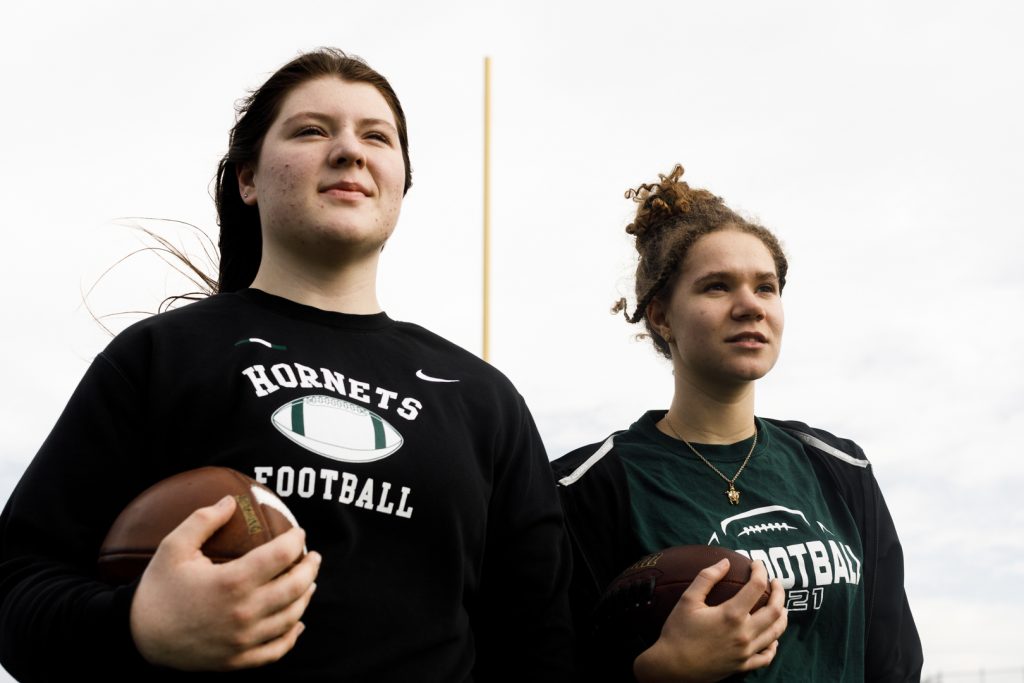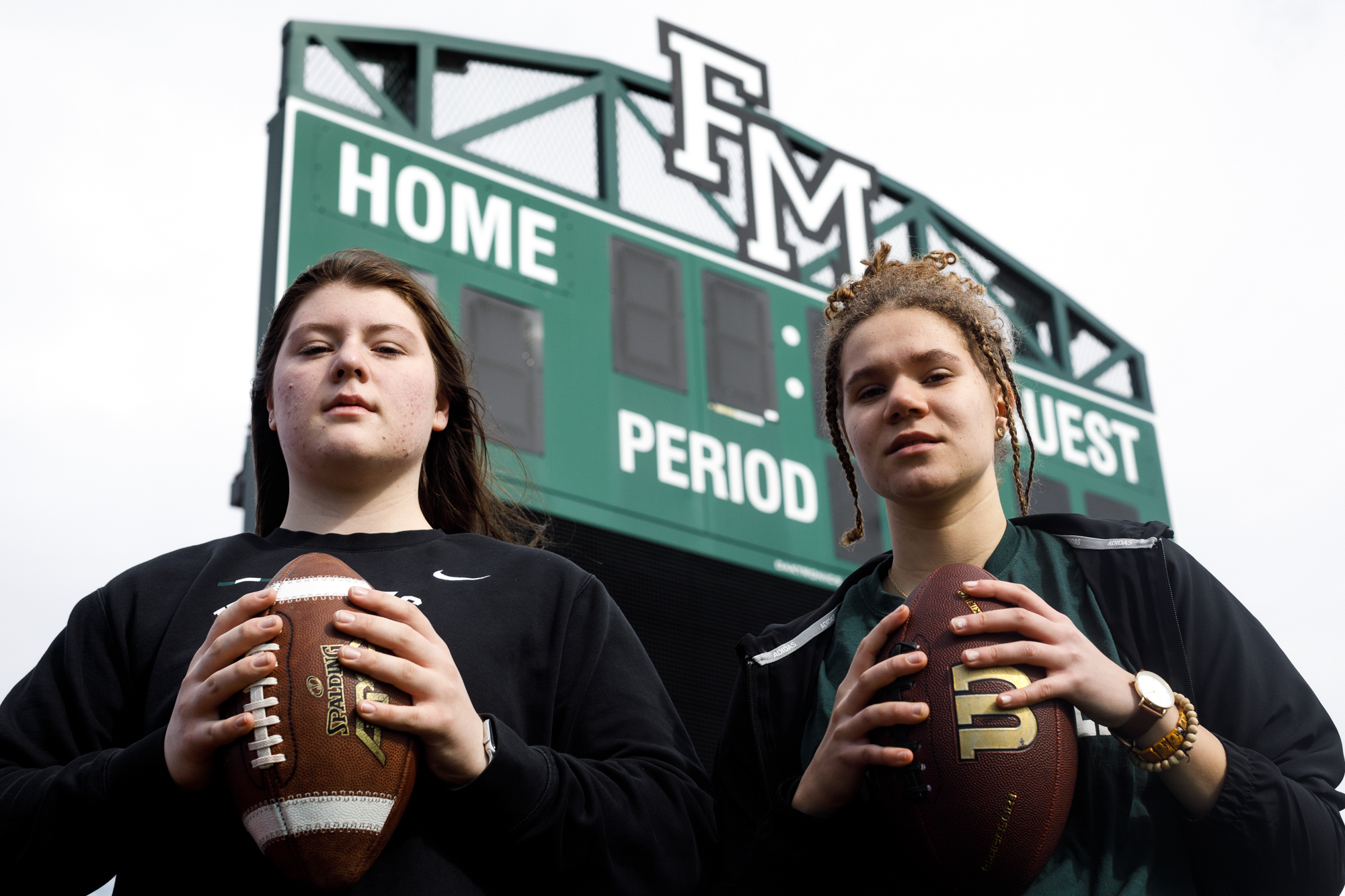Breaking the Football Barrier
Breaking the Football Barrier
In a historically male-dominated sport, two Fayetteville-Manlius players are paving the way for women in the sport.
Players joke and laugh inside the Fayetteville-Manlius football locker room. All except two, who listen from outside the doors. Their hair flows out the back of the Hornets’ white and green helmets.
Mara McBride and Julia Leary, both juniors and varsity football players at F-M, wait for a coach’s key to open a separate changing room, a routine they’ve done together after every practice and game for the last three years.
While they remove their cleats and change in a separate space, McBride and Leary play on the same Hornets’ varsity football field as the other male players. McBride, who plays on the offensive and defensive line, and Leary, who switches between free safety and running back, provide a glimpse into the evolving future of high school football.
According to data from the National Federation of State High School Associations, football participation numbers have dropped over the last 10 years despite more schools offering teams nationwide. Jamesville-Dewitt, a district less than seven miles away that traditionally plays in Section III’s Class A division against F-M, did not field a football team in 2021 because of low turnout numbers.
“There’s definitely a trend of more girls trying to join and being more competitive,” Leary said. “They don’t have to just sit and play a sport that they don’t like because all other girls are playing it.”
Leary learned that McBride played for the co-ed program and went out for the team her freshman year. McBride, whose love for the sport developed while watching the Syracuse Orange and NFL football on weekends with her dad, started playing in seventh grade.
Video by Lauren Helmbrecht and Dean Zulkofske
“I grew up around it,” said McBride, who played soccer and still dances ballet. “I never found a sport that matched my physical ability compared to football.”
Leary is drawn to football due to the sport’s aggressive nature. She said she would often foul out or draw red cards playing basketball and soccer.
“I never really had a sport that I was able to, within the rules, legally, completely ram someone,” Leary said. “It’s fun to have that ability, especially when it’s guys who don’t think you can actually do it. That just makes it so much better.”
The duo proved they were physically capable of playing a male-dominated sport under New York State’s mixed-gender regulations. Each remembers running a mile and performing sit-ups, pull-ups and push-ups before each season.
The “Athletic Placement Process” is similar to what a seventh or eighth-grade athlete trying out for a varsity or junior varsity team would have to achieve. Now, they don’t take the fitness test because they’ve passed consecutive seasons.
“At the time, I found it very frustrating, because I was like, no one else has to do this,” said McBride, who completed the test three times. “Now I reflect, and I proved to them that I could do it. But I was not very happy about it.”
They’ve had to prove they belong on the field since they showed interest in joining the Hornets football squad. Leary remembers a classmate on the football team telling her she couldn’t make it, physically.
“‘You hit like a girl.’ I get that a lot,” Leary said.
Their peers weren’t the only Hornets that responded awkwardly to women wearing shoulder pads and lining up between the tackles. McBride and Leary said coaches have changed their approach when talking to the team and have slowly adjusted well to their inclusion in the group.
“None of them really expected me to come out for the team, especially because I’m not very buff or someone that you’d expect to play football,” Leary said laughing. “At first, there was a bit of hesitancy from (the coaches) and you could tell that they were almost tip-toeing around how to treat me.”
“I think they were a bit concerned that I would get injured,” Leary said. “There was a bit of me trying to wrestle with the fact that the coaches were treating me differently, and it’s not because of something that I’m doing wrong.”
But they’ve earned their spots on the field and grown closer with teammates even without the locker room experience. McBride and Leary especially like team pasta dinners every Thursday before games, the Columbus Day 7 a.m. practice when players eat pancakes in the parking lot and practice where linemen play in scoring positions like running back and vice versa.

Leary registered a tackle in the Hornets’ lone playoff win against Central Square before F-M lost in the semifinals against Christian Brothers Academy, the eventual 2021 state champions.
“This varsity year has been so memorable,” Leary said. “In JV, we were close as a group, but varsity is when you really become more of a family.”
McBride and Leary see the future of football as men and women playing together on the same field. They’re changing the way people view the male-dominated sport, even if they’re not trying to.
A football trophy case in Fayetteville-Manlius High School displays two photographs of boys in shoulder pads holding white and green helmets. Together, McBride and Leary hope for the same.
“Football truly is a co-ed sport. It’s not just for men,” McBride said. “People always come up to us and tell us how great we are, and I don’t think we’re great for anything. We just play the sport we love playing.”
Game Changer
Ella Propheter has loved playing sports her entire life.
Propheter has been a part of soccer, basketball and track and field teams, however, it was the sport that she added to that list at age 8 that she is now most recognized for – football.
So when Propheter started at Jamestown (N.Y.) High School in fall 2021, she tried out for the junior varsity football team that her father, Steven, was coaching.
But when varsity head coach Tom Langworthy saw what the freshman could do as a kicker, he promoted her to the varsity squad, making her one of only a handful of female football players in New York state.
is the Sports Lead Producer for The NewsHouse and a magazine, news and digital journalism graduate student from Stony Brook, N.Y.
is a graduate student studying Broadcast and Digital Journalism on the sports communication track.
About
This Project Our StaffExplore
Equal Shot Enforcing Equity No ExceptionsThe S.I. Newhouse School of
Public Communications
215 University Place
Syracuse, NY 13244


